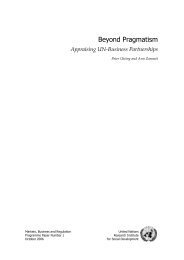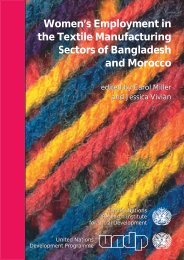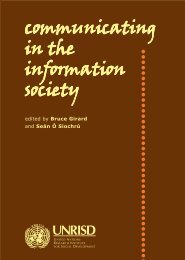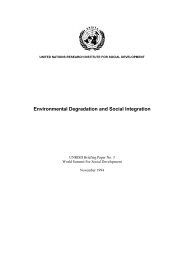RESEARCH REPORT 4 Paid Care Workers in Tanzania:
RESEARCH REPORT 4 Paid Care Workers in Tanzania:
RESEARCH REPORT 4 Paid Care Workers in Tanzania:
Create successful ePaper yourself
Turn your PDF publications into a flip-book with our unique Google optimized e-Paper software.
(TACAID: 2008) this number is small compared to the crude estimated needs of those who<br />
are ill.<br />
From the observations made from the plans and <strong>in</strong>terviews, we can propose that the HBC<br />
program is not yet allocated visible public funds and that the majority of activities related to<br />
HBC are be<strong>in</strong>g carried out by the voluntary sector. Some of the organizations which are<br />
known to be conduct<strong>in</strong>g HBC <strong>in</strong>clude: faith-based organizations, TUMAINI, <strong>Care</strong><br />
International, AMREF, World Vision, PASADA, WAMATA, FARAJA, Pathf<strong>in</strong>der, to<br />
mention but a few. In the follow<strong>in</strong>g section we review some of the challenges which non<br />
home-based care givers face, as per a reviewed of exist<strong>in</strong>g literature and <strong>in</strong>terviews conducted<br />
with care givers from some of the organizations<br />
The Non-Household <strong>Care</strong> Givers (The voluntary cadre)<br />
The PASADA HBC program functions <strong>in</strong> a three-tier system. The first tier is made up of a<br />
supervisory cadre composed of paid staff work<strong>in</strong>g for PASADA. At the time of research, this<br />
team was made up of five officers, that is, one Assistant Medical Officer (AMO), who heads<br />
the HBC unit, and four nurs<strong>in</strong>g officers. The second tier is made up of 14 community-based<br />
nurses and one cl<strong>in</strong>ical officer, located <strong>in</strong> the PASADA-owned dispensaries. These are also<br />
paid staff work<strong>in</strong>g for PASADA. The f<strong>in</strong>al tier is made up of volunteers, and at the time of<br />
this research there were 300 volunteers. These are not paid, but they are given a token fee of<br />
15,000 Tshs per month which is supposed to be a travell<strong>in</strong>g allowance. The paid staff works<br />
five days <strong>in</strong> a week, and 8 hours <strong>in</strong> a day. The supervisors carry out home visits as well as<br />
tra<strong>in</strong> and supervise the community-based nurses who <strong>in</strong> turn tra<strong>in</strong> and supervise the<br />
volunteers (PASADA: 2006, and 2007)<br />
Dur<strong>in</strong>g 2006, approximately 1,929 patients received home-based care services from<br />
PASADA, with a total of 15,371 home visits by the supervisors. This is a decl<strong>in</strong>e from 2,348<br />
patients with a total of 14,416 home visits <strong>in</strong> 2005. The decl<strong>in</strong>e is attributed to a number of<br />
factors. First, there was a community-based nurse who resigned, and hence reports were not<br />
available In addition, some of the PLWHAs who benefited from the HBC services recovered<br />
and hence graduated from HBC services, while a few might have died. (PASADA: 2006)<br />
From 2004 to 2007, PASADA had the follow<strong>in</strong>g HBC patients.<br />
No of HBC patients attended by PASADA<br />
Year<br />
No. of Patients.<br />
2004 1,426<br />
2005 2,348<br />
2006 1,929<br />
2007 2,310<br />
2008 to July 856<br />
Source: compiled by head of HBC Unit PASADA (2008)<br />
The head of the PASADA HBC unit claims that they are reach<strong>in</strong>g approximately sixty percent<br />
of the HBC patients need<strong>in</strong>g their support. The ma<strong>in</strong> role of the supervisors is to support the<br />
volunteers through provid<strong>in</strong>g them with tra<strong>in</strong><strong>in</strong>g, follow up new cases identified by<br />
volunteers, as well as visit those PLWHAs who do not have primary care givers. In addition<br />
to their monthly salaries, the supervisors receive a transport allowance of 30,000 Tshs. They<br />
also attend sem<strong>in</strong>ars, and two of the staff nurses are registered <strong>in</strong> distance learn<strong>in</strong>g. The head<br />
of the HBC unit is of the view that the nurses support<strong>in</strong>g the HBC programme are highly<br />
motivated, and are essentially driven by passion. After each home visit, they ease their<br />
tensions through group therapy, by shar<strong>in</strong>g their day’s experience, and for those few, who<br />
meet very challeng<strong>in</strong>g cases, <strong>in</strong>clud<strong>in</strong>g visit<strong>in</strong>g the most deprived households some of which<br />
12
















